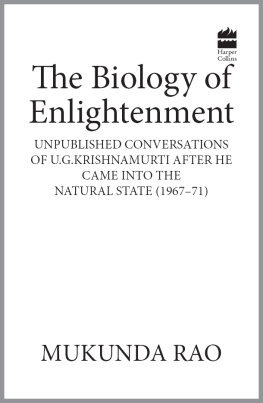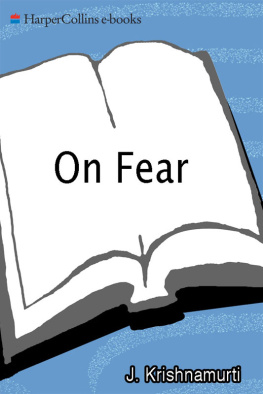LIFE AHEAD
by
J. Krishnamurti
edited by D. Rajagopal

CONTENTS
I T SEEMS TO me that a totally different kind of morality and conduct, and an action that springs from the understanding of the whole process of living, have become an urgent necessity, in our world of mounting crises and problems. We try to deal with these issues through political and organizational methods, through economic readjustment and various reforms; but none of these things will ever resolve the complex difficulties of human existence, though they may offer temporary relief. All reforms, however extensive and seemingly lasting, are in themselves merely productive of further confusion and further need of reformation. Without understanding the whole complex being of man, mere reformation will bring about only the confusing demand for further reforms. There is no end to reform; and there is no fundamental solution along these lines.
Political, economic or social revolutions are not the answer either, for they have produced appalling tyrannies, or the mere transfer of power and authority into the hands of a different group. Such revolutions are not at any time the way out of our confusion and conflict.
But there is a revolution which is entirely different and which must take place if we are to emerge from the endless series of anxieties, conflicts and frustrations in which we are caught. This revolution has to begin, not with theory and ideation, which eventually prove worthless, but with a radical transformation in the mind itself. Such a transformation can be brought about only through right education and the total development of the human being. It is a revolution that must take place in the whole of the mind and not merely in thought. Thought, after all, is only a result and not the source. There must be radical transformation in the source and not mere modification of the result. At present we are tinkering with results, with symptoms. We are not bringing about a vital change, uprooting the old ways of thought, freeing the mind from traditions and habits. It is with this vital change we are concerned and only right education can bring it into being.
To inquire and to learn is the function of the mind. By learning I do not mean the mere cultivation of memory or the accumulation of knowledge, but the capacity to think clearly and sanely without illusion, to start from facts and not from beliefs and ideals. There is no learning if thought originates from conclusions. Merely to acquire information or knowledge, is not to learn. Learning implies the love of understanding and the love of doing a thing for itself. Learning is possible only when there is no coercion of any kind. And coercion takes many forms, does it not? There is coercion through influence, through attachment or threat, through persuasive encouragement or subtle forms of reward.
Most people think that learning is encouraged through comparison, whereas the contrary is the fact. Comparison brings about frustration and merely encourages envy, which is called competition. Like other forms of persuasion, comparison prevents learning and breeds fear. Ambition also breeds fear. Ambition, whether personal or identified with the collective, is always antisocial. So-called noble ambition in relationship is fundamentally destructive.
It is necessary to encourage the development of a good minda mind which is capable of dealing with the many issues of life as a whole, and which does not try to escape from them and so become self-contradictory, frustrated, bitter or cynical. And it is essential for the mind to be aware of its own conditioning, its own motives and pursuits.
Since the development of a good mind is one of our chief concerns, how one teaches becomes very important. There must be a cultivation of the totality of the mind, and not merely the giving of information. In the process of imparting knowledge, the educator has to invite discussion and encourage the students to inquire and to think independently.
Authority, as the one who knows, has no place in learning. The educator and the student are both learning through their special relationship with each other; but this does not mean that the educator disregards the orderliness of thought. Orderliness of thought is not brought about by discipline in the form of assertive statements of knowledge; but it comes into being naturally when the educator understands that in cultivating intelligence there must be a sense of freedom. This does not mean freedom to do whatever one likes, or to think in the spirit of mere contradiction. It is the freedom in which the student is being helped to be aware of his own urges and motives, which are revealed to him through his daily thought and action.
A disciplined mind is never a free mind, nor can a mind that has suppressed desire ever be free. It is only through understanding the whole process of desire that the mind can be free. Discipline always limits the mind to a movement within the framework of a particular system of thought or belief, does it not? And such a mind is never free to be intelligent. Discipline brings about submission to authority. It gives the capacity to function within the pattern of a society which demands functional ability, but it does not awaken the intelligence which has its own capacity. The mind that has cultivated nothing but capacity through memory is like the modern electronic computer which, though it functions with astonishing ability and accuracy, is still only a machine. Authority can persuade the mind to think in a particular direction. But being guided to think along certain lines, or in terms of a foregone conclusion, is not to think at all; it is merely to function like a human machine, which breeds thoughtless discontent, bringing with it frustration and other miseries.
We are concerned with the total development of each human being, helping him to realize his own highest and fullest capacitynot some fictitious capacity which the educator has in view as a concept or an ideal. Any spirit of comparison prevents this full flowering of the individual, whether he is to be a scientist or a gardener. The fullest capacity of the gardener is the same as the fullest capacity of the scientist when there is no comparison; but when comparison comes in, then there is the disparagement and the envious reactions which create conflict between man and man. Like sorrow, love is not comparative; it cannot be compared with the greater or the lesser. Sorrow is sorrow, as love is love, whether it be in the rich or in the poor.
The fullest development of every individual creates a society of equals. The present social struggle to bring about equality on the economic or some spiritual level has no meaning at all. Social reforms aimed at establishing equality, breed other forms of anti-social activity; but with right education, there is no need to seek equality through social and other reforms, because envy with its comparison of capacities ceases.
We must differentiate here between function and status. Status, with all its emotional and hierarchical prestige, arises only through the comparison of functions as the high and the low. When each individual is flowering to his fullest capacity, there is then no comparison of functions; there is only the expression of capacity as a teacher, or a prime minister, or a gardener, and so status loses its sting of envy.
Functional or technical capacity is now recognized through having a degree after ones name; but if we are truly concerned with the total development of the human being, our approach is entirely different. An individual who has the capacity may take a degree and add letters after his name, or he may not, as he pleases. But he will know for himself his own deep capabilities, which will not be framed by a degree, and their expression will not bring about that self-centred confidence which mere technical capacity usually breeds. Such confidence is comparative and therefore anti-social. Comparison may exist for utilitarian purposes; but it is not for the educator to compare the capacities of his students and give greater or lesser evaluation.
Next page












